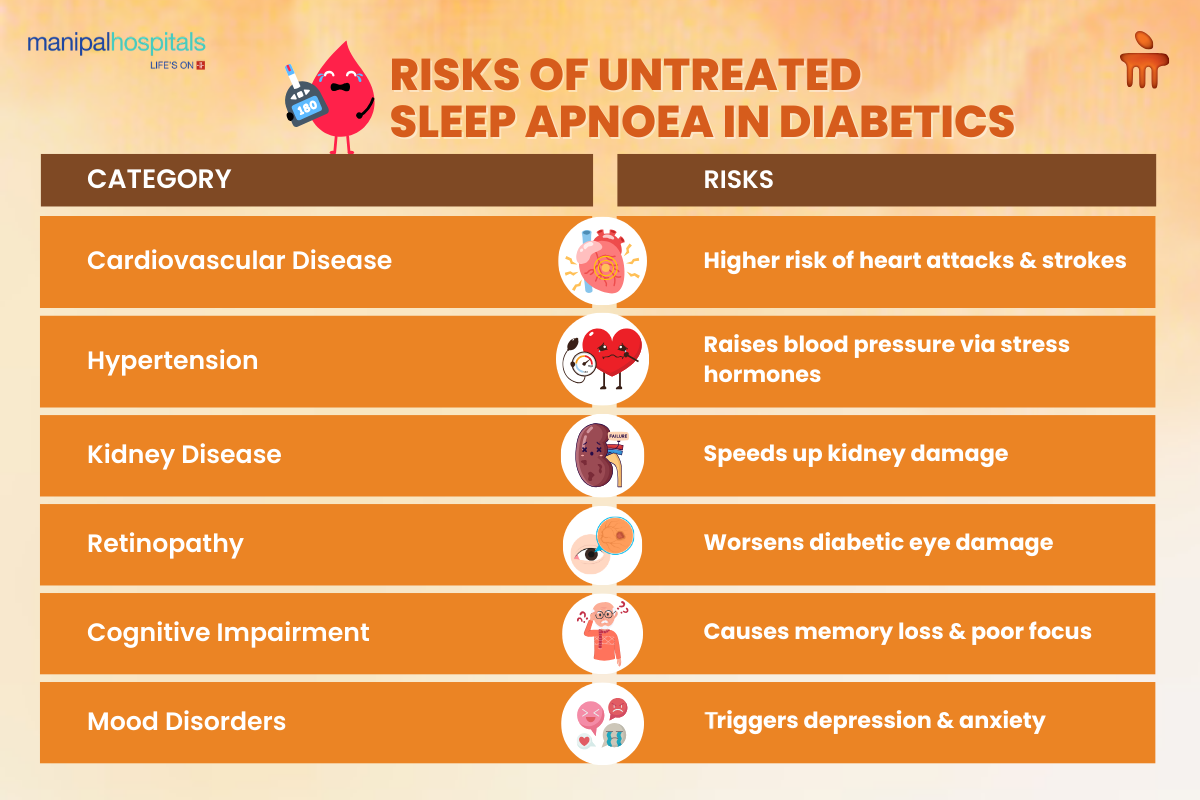
For decades, sleep apnea, or involuntary, abrupt stopping in breathing causing frequent awakening and disturbed sleep, has been known to interfere with quality of life. More recently, studies have shown that sleep apnea significantly affects metabolic health, contributing to the development and management of diabetes. Sleep apnea significantly disrupts the sleep cycles and causes several physiological changes. Here, an expert pulmonologist in Bangalore discusses how sleep apnea sets the stage for Type-2 diabetes.
Synopsis
How Sleep Apnea Influences Diabetes Development
Many people remain unaware of their sleep apnea symptoms, such as excessive daytime sleepiness and gasping for air during sleep, which may indicate an increased risk for type 2 diabetes.
-
Insulin Resistance
During sleep apnea episodes, your airway periodically collapses, cutting off breathing and causing a consequent decrease in the oxygen level within the blood. The lower oxygen levels subsequently affect insulin output in the bloodstream. The lower production of the hormone decreases insulin sensitivity within cells, resulting in insulin resistance.
-
Inflammation
The body is bound to have an inflammatory response every time the intermittent lack of oxygen occurs. Inflammation affects other body organs including pancreas which is the primary site of insulin production.
-
Oxidative Stress
Another secondary consequence of apnea-induced episodes of hypoxia is oxidative stress. With oxygen levels dipping frequently, free radicals form. The free radicals are highly reactive and damaging to cells and tissues. As time passes, oxidative stress might damage the insulin receptors and block the action of insulin, causing a signalling response and leading to insulin resistance, impairing glucose metabolism, thus fostering the development of diabetes.
-
Metabolic Changes
Sleep disruption causes hormonal imbalances, especially hormones regulating appetite and metabolism. For instance, studies have shown that low sleep increases the level of ghrelin, the hunger hormone, and reduces the level of leptin, the hormone signalling fullness. All of these might trigger excessive ingestion and weight gain. Besides, altered glucose and impaired lipid metabolism can also heighten the chances of diabetes mellitus.
Risks of Untreated Sleep Apnea in Diabetics

Untreated sleep apnea will exacerbate existing complications in patients who already have diabetes. In general, health will deteriorate from the additive effect of poor sleep and blood glucose not being controlled well.
-
Cardiovascular Disease
Both sleep apnea and diabetes are risk factors for cardiovascular disease. When together, they pose a significant burden on the heart, which then increases susceptibility to heart attacks, strokes, and other such events. Sleep disruption, through increasing blood sugar levels and the pressure built up in the blood, can make an individual susceptible to heart disease.
With close ties to high blood pressure, which often accompanies diabetes, there are frequent interruptions in sleep. These can make the body call on its fight-or-flight responses, leading to increased cortisol levels and other stress hormones and a rise in blood pressure.
-
Kidney Disease
The association between sleep apnea and kidney disease in diabetic patients has been well-proven. Sleep apnea speeds up the degradation of kidney functions, which forms a part of chronic kidney disease, and this may be attributed to blood pressure fluctuations and an increase in cardiovascular risks
-
Retinopathy
It causes diabetic retinopathy in patients with diabetes. Diabetic retinopathy is an eye disease resulting from blood vessel damage that leads to loss of eyesight. Sleep apnea may further exacerbate this condition.
-
Cognitive Impairment
Sleep apnea has been known to impair cognitive functions, which range from memory loss to decreased concentration to overall brain health. In a patient with diabetes, the impairment of cognitive function can make the disease more challenging to control, hence impairing one's ability to make decisions regarding care.
-
Mood Disorders
Sleep apnea may also precipitate mood disturbances, such as depression and anxiety. Chronic fatigue due to poor-quality sleep contributes to these situations and can make managing diabetes more complicated. Lastly, mood disorders can also impact general well-being and the ability to follow the treatment regimens prescribed strictly.
Treatment of Sleep Apnea and Its Impact on Diabetes Management
CPAP therapy, an effective sleep apnea treatment, significantly improves insulin and glucose metabolism. CPAP provides constant streams of air that keep the individual's airway open as they sleep, avoiding the pauses in breathing that are characteristic of sleep apnea.
Lifestyle Changes
Lifestyle modification such as maintaining a healthy weight with diet and exercises, in combination with CPAP therapy, could reduce the impact of sleep apnea on diabetes. Appropriate body mass, regular exercise, and avoiding alcoholic beverages and sedatives at bedtime will optimize sleep quality. Reducing the severity of apnea episodes improves glucose management.
Conclusion
Sleep apnea is a severe condition and can significantly impair health, especially if you have diabetes. This is why it is essential to know the relationship between sleep apnea and diabetes to manage diseases effectively. When you treat sleep apnea, you're not only sleeping better, but you are also improving the body's function in regulating blood glucose levels, decreasing inflammation, and preventing complications such as cardiovascular disease and kidney damage. If you're suffering from sleep apnea, it is recommended to consult your healthcare provider for appropriate medical assistance.
FAQ's
Yes, it poses a very major risk for someone to develop type 2 diabetes from untreated sleep apnea, although it might provoke some metabolic and insulin resistance responses.
CPAP treatment improves sleep quality, reducing the opportunities for blood glucose to surge and breaking down glucose into a usable form. This helps reduce insulin resistance and improve metabolic health.
Untreated sleep apnea can lead to worsening glucose control, increased risk of cardiovascular disease, hypertension, kidney disease, and worsening of complications of diabetes, such as retinopathy.
Sleeping on your side is the best position for managing sleep apnea, as it prevents airway obstruction and improves breathing during sleep.
Yes, untreated sleep apnea leads to frequent oxygen drops, triggering stress hormones that increase blood sugar levels, especially at night.
No, other treatments include lifestyle changes, weight loss, oral appliances, positional therapy, and surgery for severe cases.



















 5 Min Read
5 Min Read






.png)




